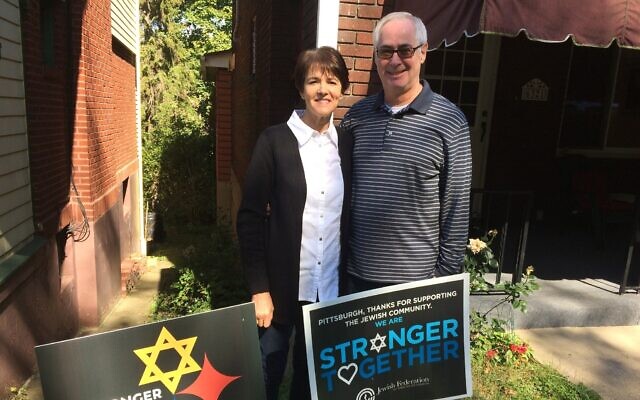The prosecution rested Wednesday after its final four witnesses testified for the guilt phase of the synagogue massacre trial.
The defense called no witnesses.
Closing arguments will be presented Thursday before the jury deliberates on the defendant’s guilt.
If the defendant, Robert Bowers, is found guilty — he faces 63 counts, including 11 for the obstruction of the free exercise of religion resulting in death — the second phase of the trial will begin to determine whether he is eligible for the death penalty. If he is found eligible, the prosecution will offer victim impact statements during the trial’s third phase, and the defense will offer evidence that might mitigate the imposition of the death penalty.
The prosecution’s final witness, Andrea Wedner, testified about seeing her mother, Rose Mallinger, 97, die after being shot by Bowers — and about being shot herself.
Wedner testified that shortly after Shabbat services began on Oct. 27, 2018, she heard what sounded like a “high shriek sound,” then many gunshots in the hallway outside the Pervin Chapel in the Tree of Life building.
“My mother looked at me and said, ‘What do we do?’ in a very scared voice,” Wedner recalled.
The rabbi told them to “get down,” so they did. They had no other option.
“My mother couldn’t have run, and we didn’t know if there were other people shooting,” Wedner said.
She recalled seeing the shooter standing toward the back of the chapel, not far from where she and her mother were hiding — under their pew, lying head-to-head.
“I saw a white male with light-colored or gray hair, with a light-colored jacket,” Wedner said, “and he was holding a big, long gun.”
She and her mother “were filled with terror,” Wedner testified. “It’s indescribable. We thought we were going to die.”
Out of the corner of her eye, Wedner saw the shooter walk to the side of the chapel opposite from where she and her mother were taking cover.
“I was frantic,” Wedner said. “I was scared as scared could be.”
She heard Bernice Simon on a call with 911, saying, “My husband’s been shot in the back.” Then Wedner called 911 as well.
Assistant U.S. Attorney Troy Rivetti said that in deference to Wedner’s request, the recording of that nine-minute call would not be played in her presence.
“I saw my right arm get blown open in two places,” Wedner then testified, adding that she also saw cuts throughout her body and shrapnel throughout her body and face.
“The pain was the worst I’ve ever felt,” she said.
Wedner stayed on floor and didn’t move, she said, in case the shooter “was still there or came back. I didn’t want him to know I was alive.”
She saw her mother was shot and that she “wasn’t going to survive.” Wedner didn’t run to find another hiding place, she said, because “I wasn’t going to leave my mother.”
Wedner stayed in place until she was rescued by SWAT officers.
At the time of her rescue, no one else in the Pervin Chapel was still alive, Wedner said.
When she left her mother, she said, “I kissed my fingers and touched my fingers to her skin and cried out ‘Mommy.’”
Wedner began her testimony by recounting how she was a lifelong resident of Squirrel Hill, and that she and her mother — who still was “sharp as a tack” — were regular attendees at Tree of Life’s Saturday morning services. Mallinger led the congregation in the Prayer for Peace each week, and Wedner often led other prayers or dressed the Torah.
Wedner was in the hospital for 10 days following the shooting. She’s had two surgeries in her arm and surgeries on her face and her hand. A dental hygienist, she has not been able to return to work because of her injuries.
The 911 call Wedner placed that morning was played for the jury after she left the courtroom. Screams are heard in the background as Wedner tries to calm her mother in whispers.
“Oh, God, I can’t believe this is happening,” she says.
SWAT Officer Timothy Matson, who was part of the team responding to the massacre, took the stand before Wedner. He described following a trail of gun magazines to the shooter upstairs. He saw doors to the left and right of a landing when he ascended the stairs and made the decision to enter one of the rooms, which was “total dark,” to protect his team. He was then shot in his leg and his head.
While he doesn’t remember everything that transpired afterward, he does remember telling a fellow officer that he was “f—ed up,” and that he was having trouble breathing.
He also remembers feeling “an indescribable amount of pain” as a tourniquet was being applied to his leg in the ambulance.
As a result of those gunshots, Matson has undergone several surgeries and has suffered permanent injuries, including some memory loss. It was two years before he could go back to work.
When asked if he would make the same choice again — to enter a dark room where a gunman might be lurking — he said, “Absolutely. I would go through any door for my team at any time.”
Earlier Wednesday morning, Peter Hammer, an FBI forensic analyst who examined the computer in the defendant’s apartment the day of the shooting, testified that the defendant had programmed his computer to erase all its data after 200 minutes — a sophisticated process.
“I have never seen anybody set up a time to wipe their data,” Hammer said.
As a result, Hammer was unable to access “any usable content” from that computer.
FBI Special Agent Brian Collins, team leader for the evidence response team, testified about some of the evidence collected at the Tree of Life building and in the defendant’s car. The address on the defendant’s driver’s license, Collins testified, was that of a storage unit or post office box, and not the address of his apartment.
Collins also traced a detailed timeline of the events of Oct. 27, 2018, beginning with the defendant accessing the HIAS (originally the Hebrew Immigrant Aid Society) website at 8:17 a.m., and concluding with the defendant being handcuffed by police at 11:13 a.m. The government’s indictment against the defendant alleges that before entering the Tree of Life building that morning, he posted the following on the website Gab.com: “HIAS likes to bring invaders in that kill our people. I can’t sit by and watch my people get slaughtered. Screw your optics, I’m going in.”
Related story: Resources are available to ease trauma during synagogue shooting trial.
Toby Tabachnick is editor of the Pittsburgh Jewish Chronicle. This story is part of ongoing coverage of the Pittsburgh synagogue shooting trial by the Pittsburgh Jewish Chronicle and the Pittsburgh Union Progress in a collaboration supported by funding from the Pittsburgh Media Partnership.

Toby Tabachnick
Toby is editor of the Pittsburgh Jewish Chronicle. She can be reached at ttabachnick@pittsburghjewishchronicle.org.


